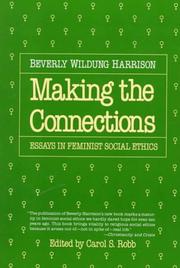 I first heard of Beverly Wildung Harrison when I was a graduate student in theology and discovered her landmark book Our Right to Choose: Toward a New Ethic of Abortion (Beacon, 1983) while studying feminist ethics. It was already more than ten years old then, and it’s nearly thirty years old now as we move toward the 40th anniversary of Roe v. Wade in the coming month. I remember being so grateful, so impressed, and so inspired with her theological ethics that embraced women’s moral agency, including and especially around procreative choices. I was relieved and forever convinced that conservative Christians opposed to choice had absolutely no monopoly on creative, sound, and constructive theological ethics.
I first heard of Beverly Wildung Harrison when I was a graduate student in theology and discovered her landmark book Our Right to Choose: Toward a New Ethic of Abortion (Beacon, 1983) while studying feminist ethics. It was already more than ten years old then, and it’s nearly thirty years old now as we move toward the 40th anniversary of Roe v. Wade in the coming month. I remember being so grateful, so impressed, and so inspired with her theological ethics that embraced women’s moral agency, including and especially around procreative choices. I was relieved and forever convinced that conservative Christians opposed to choice had absolutely no monopoly on creative, sound, and constructive theological ethics.
Harrison passed away a few days ago, December 15, 2012. I had opportunity to meet her in passing a couple of times over the year, and knew her only through her work, including the 1985 collection of essays in femnist social ethics, Making the Connections. Additionally, I know many amazing feminist theologians and ethicists who were her students during her three decades of teaching at Union Theological Seminary in New York City. These women and men, themselves now doing important work for justice, speak regularly about the power of Harrison’s teaching and example.
Over at Feminism and Religion:
She was known to say, “Bless you, and bless the revolution.” We bless and celebrate Beverly’s life, her wisdom, strength, generous nature, and commitment to our community. May she rest in peace and may we all continue the revolution!
And in an email to a group I am in, a former student of Harrison’s echoed this point, and closed her note to us about her mentor’s passing saying “God Bless the Revolution.”
We know that when it comes to women’s lives and bodies, the revolution continues, and it needs more support than it has in a generation. The 2012 election season and the years of state legislative action leading up to it brought newly vicious attacks on women’s health and moral agency. There is so much work to do, and we are well served to hear and heed the wisdom of Bev Harrison.
Here, some words from Making the Connections:
“A treatment of any moral problem is inadequate if it fails to analyze the morality of a given act in a way that represents the concrete experience of the agent who faces a decision with respect to that act. Misogyny in Christian discussion of abortion is evidence clearly in that the abortion decision is never treated in the way it arises as part of the female agent’s life process.” (p.123)
“There has been an objective gain in the quality of women’s lives for those fortunate enough to have access to procreative choice. That millions upon millions of women as yet do not possess even the rudimentary conditions – moral or physical – for such choice is obvious. Our moral goal should be to struggle against those real barriers – poverty, racism, and antifemale cultural oppression – that prevent authentic choice from being a reality for every woman.” (p.126)
“Whatever one’s judgement about the moral status of the fetus, it cannot be argued that that assessment deserves greater moral standing in analysis than does the position of the pregnant woman. … I cannot believe that any morally sensitive person would fail to value the woman’s full, existent life less than they value early fetal life.” (p.127)
“One of Christianity’s greates weaknesses is its spiritualizing neglect of respect for the physical body and physical well-being. Tragically, women, more than men, are expected in Christian teaching never to honor their own well-being as a moral consideration.” (p.129).
“A feminist position demands social conditions that support women’s full, self-respecting right to procreative choice, including the right not to be sterilized against our wills, the right to choose abortion as birth control means of last resort, and the right to a prenatal and postnatal health care system that will also reduce the now widespread trauma of haiving to deliver babies in rigid, impersonal health care settings.” (p.132).
“We do best politically when we make the deep connections between the full context of this issue in women’s lifes, including this society’s systemic or patterned injustice toward women.” (p.132).
With gratitude and humility, we are all better because of the life and work of Beverly Wildung Harrison.












